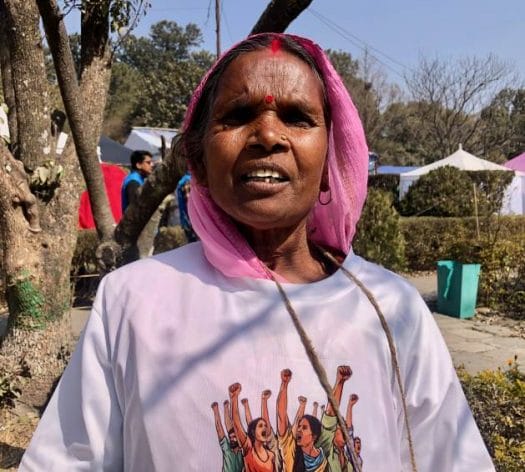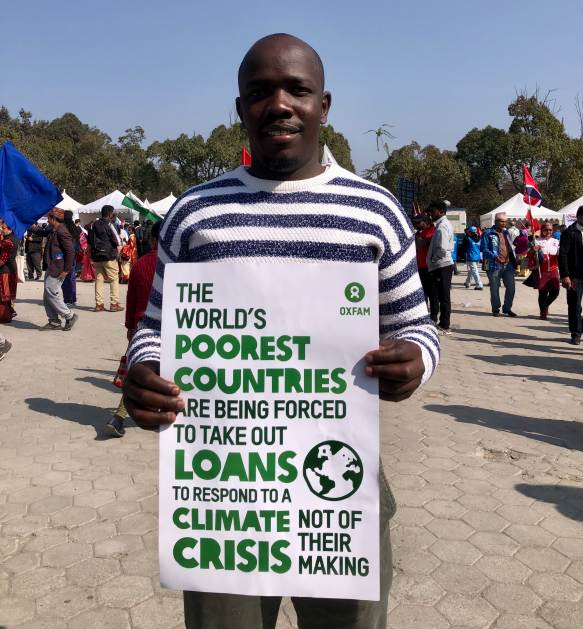Asia-Pacific, Civil Society, Development & Aid, Environment, Global, Headlines, TerraViva United Nations

Shanti Decinis, one of 30,000+ participants expected at the 2024 World Social Forum, which advocates for a just world for all people. She described how in her village in Bihar, India, farmers are dealing with climate-induced unpredictability. Credit: Tanka Dhakal / IPS
– Kiprotich Peter from the East African country of Kenya is trying to convey his climate crisis message using the platform of the World Social Forum (WSF) taking place in the mountain nation of Nepal, which has also been battered by the impacts of climate change.
Youth activist Peter, who works for Green World in Kenya to promote environmental education and reforestation, is holding a placard that reads: “The World’s Poorest Countries are being forced to take out loans to respond to a climate crisis not of their making,” on Thursday, Day 1 of the WSF in Nepal’s capital Kathmandu.
“I am here to raise my voice against loans to deal with the climate crisis. Small countries like Kenya and Nepal need grants to fight and mitigate the climate crisis, not loans,” he added. “The climate change is a real-time crisis in Africa, and I think in Nepal and other parts of the global South too.”
Low and mid-income countries like Nepal and Kenya have contributed just tiny amounts of the greenhouse gas emissions that cause climate change, but they are on the frontlines of its impacts, in the forms of droughts, flash floods and other extreme weather events.
According to the 2023 Kenya Country Climate and Development report, to maintain gains in poverty reduction, the country must act on climate change. “Inaction against climate change could result in up to 1.1 million additional poor in 2050, in a dry and hot climate future scenario.”
“Humanity of people is taken away”
Far from Kenya but close to Nepal in South Asia, one third of Pakistan was submerged because of a massive flood in 2022, affecting 33 million people. Pakistani historian and youth leader Ammar Ali Jan described the aftermath of that flood and the international community’s treatment as an ugly image of humanity.
“Almost a province was wiped out; we haven’t seen a flood like that. The way people were attacking food trucks, it was almost as if the humanity of people was taken away,” said the founder and president of the Haqooq-e-Khalq Party addressing a session called, Towards a Global Movement for Climate Justice, on Friday.
“People were in hunger without having anything to eat; they were stuck. It’s as if these people are becoming disposable human beings, and their deaths will not be mourned because their lives are not valued enough,” added the leader of his country’s new ‘Green’-inspired party.
Ali blamed an International Monetary Fund loan for the economic deterioration that followed the disaster. “The IMF’s loan was given after six months, not by saying ‘we will give you this grant and forgive your debt because you are affected by a crisis not of your making.’ They said ‘you must pay every penny to the international creditor.’ We need support, not loans.”
The party leader argues that a large chunk of humanity is lacking empathy, while retaining resources and political power. “To achieve climate justice, we need to find ways to make our agenda, the people’s agenda, heard,” he added. “Progressives need to take power.”
Shanti Devi was listening to Ali and nodding her head. “It’s what’s happening in our village in Bihar, India. We don’t get rainfall when needed, and floods hit at the time of harvesting,” said Devi, adding that she was attending the WSF to make her voice heard.

Kenyan youth climate activist Kiprotich Peter calls for grants instead of loans, for countries grappling with climate-induced crises at the World Social Forum in Kathmandu on 16 February 2024. Credit: Tanka Dhakal / IPS
“No Forum Left Uncontested”
Indian researcher and science activist Soumya Dutta called for continuous pressure to make the voices of the frontline communities that live with the consequences of climate-induced changes heard in every forum. “We have long crossed climate change; we are in a climate crisis,” he said during a discussion on climate justice. “We need to elevate the social movement to create a larger political discourse.”
Other speakers and participants called for collaboration and support to address the world’s crises, including climate change. United Nations Secretary-General Antonio Gutters also urged unity in his message to the WSF: “We need global solidarity to rescue the Sustainable Development Goals – and reform an outdated, dysfunctional and unfair global financial system. We must also rally together to address the climate crisis.”
While laying out the stark reality of climate change’s impacts on communities, water and climate change researcher Ajaya Dixit proposed a way forward. “We are still taking nature for granted, which needs to changed,” said the Nepal-based researcher, who collaborates with other researchers in South Asia. “To understand climate change, we have to understand the water and hydrological cycle, because the crisis we are facing is all connected with water one way or another.”
According to Dixit, to understand the ground reality of climate change, science and community must come together. “We still hesitate to recognize community knowledge, especially the historical knowledge of Indigenous people. Natural science, physical science and community knowledge need to be combined in our education systems; then we will be able to better understand climate change and act accordingly.”
